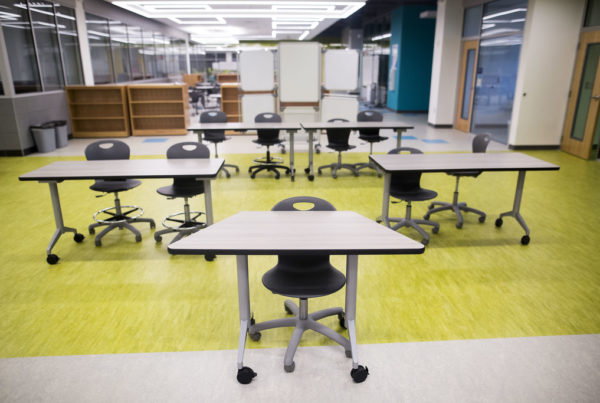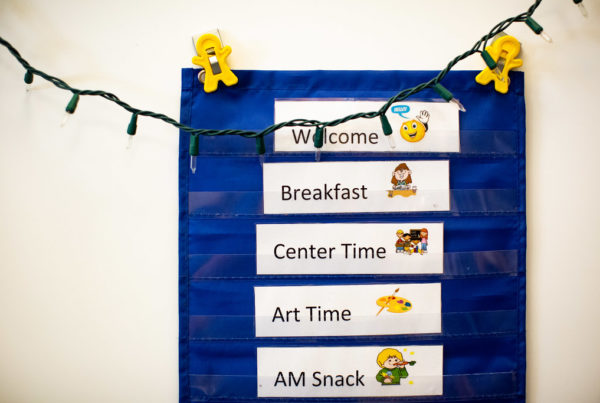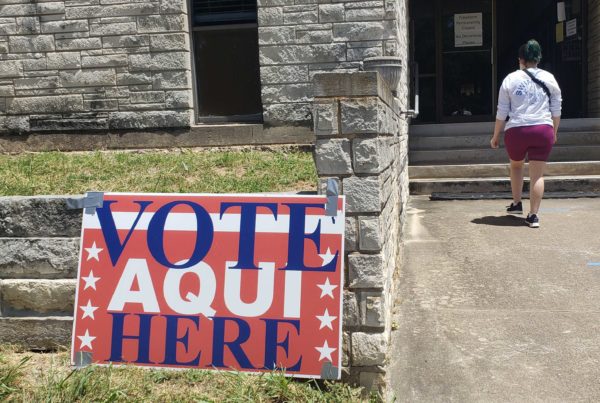From KTTZ:
The pandemic has wreaked havoc on school systems. Many families have struggled to cope with online learning – especially those with kids who have special needs. Two families in Lubbock County share their very different experiences.
16-year old Mahaya Moore stands beside her mom at their Cajun food stand, Moore’s Cajun Smokehouse, at the Wolfforth Farmer’s Market. Mayaha was born hypoxic, meaning her brain was deprived of oxygen at birth. She has epilepsy and multiple grand mal seizures have left her brain damaged. Talking is a challenge but she’s learned to form sentences.
One phrase has become her favorite. “Mahaya has a saying at the market, ‘Louisiana style.’ Everybody hears it,” her mom, Kate Moore, said.
Her daughter’s wild red hair and outgoing demeanor makes her the best marketing tool for her parents. She loves to be social. So when schools shut down in spring because of COVID-19, Mahaya didn’t do well.
According to her dad, Mitchell Moore, most children with special needs need daily structure, which school provides. “But when she was removed from that she lost that structure, lost the learning…she loves learning,” he said.
Kate and Mitchell did their best to provide the structure Mahaya thrives in. But virtual learning didn’t replicate the benefits of being in the classroom. Plus, her parents were also homeschooling her three other siblings. So this fall when Frenship ISD gave families the choice to return in person or virtually, the Moore family sent their anxious daughter back in-person.
The first day of school, Mahaya’s teacher Deborah Hardy was excited to see her students again. This year presented a unique set of challenges for the teacher of over 20 years. “With the masks, I may have to have the students to repeat themselves like three times, which I hate to do, but that’s what it takes,” she said.
Despite these challenges, Kate said her daughter’s fears about the virus have faded. And Mahaya now loves wearing her mask, because it makes her feel like an EMT.
In another household —same school district— a computer reads a test question to 6-year-old Olivia Anders. Olivia’s in pink kitten pajamas and her wheelchair is pulled close to the monitor. Her mom supports her arm as she punches the answer onto the touchscreen monitor. She has cerebral palsy and she’s using her mom’s computer because the test didn’t work on her tablet.
“She has a physical disability she does not have an intellectual disability,” Chelsea Anders, Olivia’s mom, said.
In fact, Chelsea said Olivia scored in the 97th percentile for reading. Unlike Mahaya’s parents, Chelsea opted to keep Olivia home, to avoid the health risks. She was also trying to shift Olivia from the special ed class to the mainstream kindergarten class.
But when school started it took nearly two weeks to access her mainstream classroom online.
“Day one it was like, alright, ok — not gonna get upset. But by day four I’m seeing other parents…I’m thinking this doesn’t feel right to me,” her mom said.
Chelsea contacted multiple administrators, all the way up to the district’s special education director, Jill Jaquess.
“Those were just some of the kinks that we had to work out,” Jaquess said, pointing to technology glitches as the culprit for this situation. “I mean that’s kids, teachers, parents and administrators. Everyone is working to learn that.”
Chelsea’s response to her daughter’s dilemma was, “I get it like if a technical glitch is the reason this is happening I get it, one day or two days.
“If you can’t figure it out in two days, then you need to come up with a better solution…so I think probably what’s happening is she got left out.”
Colleen Elbe is a supervising attorney with Disability Rights Texas. Since the pandemic shut schools down in March, her organization has seen an uptick in clients seeking services statewide. Some dealing with issues with technology, others seeking compensatory education for their child falling behind in spring.
Elbe said successful virtual learning depends on a combination of factors: the need of the student, family involvement, open dialogue with school administration, and most importantly — a commitment to providing quality services. “Whether that’s to a child sitting in desk, or sitting in a chair in their living room,” Elbe said. “That can be done and it has been done. We’ve seen that.”
Chelsea Anders didn’t feel that commitment from Frenship ISD. By the time Olivia was able to access her classroom online, her parents were fed up. They transferred her to Lubbock Independent School District, which was offering Olivia a dedicated aid. The new school’s special ed staff even came to the house to meet Olivia. The only catch—she has to go in person.
“We didn’t want to look a gift horse in the mouth,” Chelsea said. “LISD’s willingness to get her an aide, I think that was the most important thing to us.”
Chelsea said so far her daughter seems happy at her new school. She doesn’t cry everyday like before — but she’ll still whine a little from the back seat as her mom drives her to school.
Meanwhile Mahaya Moore, the high school sophomore, is in her seventh week in-person at Frenship ISD. Her parents say she is happy to be back among her friends. Mahaya’s dad, Mitchell has nothing but praise for the school district. “She’s back on track to be honor-roll again,” he said, brimming with pride for his girl. “Frenship is a great district. I cannot praise the Frenship teachers here more highly.”
Frenship ISD responded with a statement in regards to Olivia’s problem accessing her virtual classroom: “Due to the Family Educational Rights and Privacy Act (FERPA), Frenship cannot legally discuss educational records and information specific to a student. While we cannot discuss this child’s specific situation, we can tell you that as a District there have been challenges with Virtual Learning for all types of learners, parents, and teachers. Early on with the rollout of Virtual Learning, an entirely new concept for districts across the country, we saw a few hiccups with the set-up, connecting students to the correct resources, and learning the technology.
The Frenship Special Education Department faced unique challenges in not only providing curriculum to students, but also ensuring the students could still access specialized services remotely. Very quicky, Frenship’s Special Education teachers and staff established creative ways to continue offering services through programs such as teletherapy.
As we continue moving forward through the pandemic, Frenship teachers and staff remain committed to working with the families to meet the needs of our students.“
Have a news tip? Email Kaysie Ellingson at kaysie.ellingson@ttu.edu. Follow her reporting on Twitter @KaysieEllingson.















